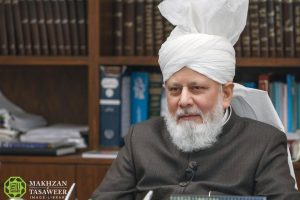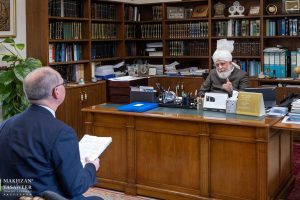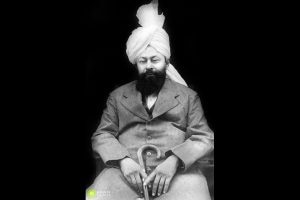
Tariq Mahmood, Canada
Every person who sincerely seeks God will find Him. This is the personal promise of God Almighty, attested to by countless upright and pious souls throughout history. The Promised Messiah and Imam Mahdi, Hazrat Mirza Ghulam Ahmad (as) states:
‘The Living God is He Who can inspire us directly, or could at least bring us in contact with one who is directly inspired. I convey this good news to the whole world that the God of Islam is such a Living God.’ 1
The lives of God’s chosen ones reflect the Divine hand that propels them to unprecedented victories like a polished mirror.
Such was the life of Hazrat Mirza Tahir Ahmad (rh), the Fourth Caliph of the Ahmadiyya Muslim Community. Anyone who got to know Hazrat Mirza Tahir Ahmad (rh), was drawn to his spiritual magnetism.
Before he was dyed in the colours of sainthood, he found himself as a young man exploring the grandest existential questions and even the nature of God Himself. At first, he took to studying the universe to find God. As he studied, a realisation dawned on him:
‘I think that I am logical by nature — it is built in me — so I studied the question of the sheer possibility of the existence of God. As I studied I began to realise that in the different stages of consciousness there are gaps – just as there are gaps between the consciousness of a lower species and the consciousness of man.
To put it very simply man is conscious of the existence of, say, an ant, but the ant is not conscious of the existence of man. So if there are distances between ant and man there would obviously be a very much greater distance between man and God. So I resolved my first question by humility.’ 3
So, the young Hazrat Mirza Tahir Ahmad (rh) took to prayer. The theory of God was tenable to him; however, where was this God? Did he communicate? He would pray ‘If you exist, then I am in search of you. Let me know that you are there otherwise I may drift astray and may not be held responsible.’
He describes God’s answer to his prayer:
‘I was in a state of semi-consciousness — halfway between a dream and reality. I saw the entire earth squeezed into a ball. There was no creation of any sort visible — no life, no cities, nothing — just the earth. Then I saw each particle of the world tremble and burst out into a slogan: OUR GOD! Each particle was proclaiming the reason for its existence.
“The whole world was flooded with a strange light and every atom of the earth began to swell and contract in rhythm. I found myself repeating the words OUR GOD.’
This experience, he later related, was so incontrovertibly conclusive; that from then on, no inkling of doubt remained in his heart.
Divine support shined through his life like a towering minaret. He narrates that once, prior to his Khilafat (Caliphate), he landed in Chicago at 2:30 a.m. He was worried about getting lost, as he had no map, and Chicago was an extremely widespread city. He was reminded of a particular verse that comforted him. He himself explains:
‘I told my wife and children to relax and go to sleep. I then took some right-hand turns and some left-hand turns and drove for quite a distance.
We stopped at a petrol station and I dialled the number of our mosque. We discovered that we were just a few streets away.’4
Hazrat Mirza Tahir Ahmad (rh) narrates:
‘In Norway much the same thing happened — we stopped a passerby and asked in English if he knew where our host lived. He said, “Yes, he lives next door to me.”’
‘In Holland we asked some boys if they knew where the mosque was. They said, “Ahmadiyya mosque? Why certainly. Follow us. ”’
Allah the Almighty manifests His many attributes in astonishing ways through His servants. They become like mirrors, so clean and free from the filth of human carnal weakness, and begin to shine like fragments of the sun, here on this very earth.
The Fourth Caliph (rh) relates:
‘Once, I went to Ghana. I met a chief named Nana Ojefu, who was Christian. On my first night there, he came to meet me, and after the prayer, he expressed his desire to take the Bai’at (initiation) at my hands. When I asked the missionary why this was so, he replied that the chief is from a superstitious tribe. His wife would get pregnant but kept losing the child. He met Christian and Voodoo priests, but to no avail.
When he exhausted all options and became hopeless, he went to meet Imam Wahab Adam and said “though I am Christian, I have lost faith in the Christian prayer. I have heard that God accepts your community’s prayers. Write my circumstances to your Imam, and ask him to pray for me.”
Thus, Wahab Sahib sent his letter to me. I wrote back to him and replied “you will be blessed with a beautiful and long-living child.” Thus, when his wife became pregnant, the doctors said ‘not only will your child die, but this illness will cause your wife’s death as well. Thus, we suggest you get an abortion.
The chief said “I will never. I have received a letter from the Imam of the Ahmadiyya Community. Neither will my wife be harmed, nor my child.” As a result, Allah blessed them with a beautiful, healthy boy, and his wife was completely healthy. Witnessing this incident of the acceptance of prayer, he desired to take the Bai’at (initiation) at my hands. This is why he waited for me.’ 4
In another instance, Hazrat Mirza Tahir Ahmad (rh) mentions a miracle in the face of hatred. The Fourth Caliph (rh) states:
‘An Ahmadi from Dhaka (Bangladesh) writes regarding his non-Ahmadi friend that “I would give him literature of the Ahmadiyya Community, and would play cassettes for him. Due to this, his heart quickly began to change. He developed an attachment to the literature and would enthusiastically ask for more books.”
During this time, he developed an eye ailment, and the doctors declared that his eyesight would continue to diminish. In regards to worldly science, they said there is no treatment that could save his eyesight.
When his non-Ahmadi friends found out, they began to mock him, and sarcastically said “now read more Ahmadi books. By reading these books, your eyes are being filled with the fire of Hell, which has caused your eyes to become ash. This is punishment for your actions.”
The non-Ahmadi friend mentioned these hateful words to his Ahmadi friend with great worry. The Ahmadi friend replied “Be at ease. Pray, and I will also pray. I will write to my Imam for prayers, and then you will see how Allah bestows His blessings.”
Thus, the Ahmadi writes that after some days, the situation completely changed, and his eyesight started to return. When we went to the doctor the second time, he said ‘there is no sign of this dangerous ailment remaining.’ 5
This was the hallmark of Hazrat Mirza Tahir Ahmad’s (rh) prayers. Every chapter of his life proved that when a lone man’s prayers are fervent, is Allah not sufficient for His servant?
Evil raises its head in every age, often in the form of oppressors. They seek to destroy the righteous, for they despise them as the antithesis of their tyranny.
In 1982, God Almighty donned Hazrat Mirza Tahir Ahmad (rh) the mantle of Khilafat. This responsibility was given at a precarious time. Four years prior, a brutal military dictator named Zia-Ul-Haq began a new era of injustice against the Ahmadiyya Muslim Community.
Just two years into his Caliphate, Ordinance 20 was passed prohibiting Ahmadis from calling themselves Muslim, identifying their faith in any form, or propagating it. 7Hazrat Mirza Tahir Ahmad (rh) often condemned Zia-Ul-Haq and urged him to mend his ways or face the wrath of God. The advice was not heeded.
With the oppression of Zia’s draconian regime stifling religious freedom, Hazrat Mirza Tahir Ahmad (rh) decided to leave Pakistan.
In the midst of these flames of trial, the mighty hand of the heavens was manifested.
An Ahmadi named Mr. Usman Chou was shown the whole plan to capture Hazrat Mirza Tahir Ahmad (rh) beforehand in a dream. He wrote to the Fourth Caliph (rh), after which the Fourth Caliph (rh) understood that his departure would be protected by God.
A person was sent to Karachi to book tickets. Two flights were to depart – one on Monday at 2 A.M, and the other on Wednesday. This person met with the KLM manager, who said no seats were available for the Monday flight, but that he would somehow find a way to make 6 seats available. The Ahmadis were later told that this was because the Wednesday flight would have a layover in an Arab country, and if an arrest warrant was released, the Caliph could be arrested while on a layover.
Shortly before takeoff, an arrest warrant was issued for the Caliph. It read that ‘Mirza Nasir Ahmad, who calls himself the Khalifa of the Ahmadiyya Movement, is not to be allowed to leave Pakistan.’ The Pakistani government, perhaps blinded by their own hatred, had issued a warrant for the name of the previous Caliph by mistake! The offices were called in Islamabad, but it was 2 A.M. and no one picked up. What was apparently little more than a clerical mistake proved miraculously instrumental, and Hazrat Mirza Tahir Ahmad (rh) could not be stopped from leaving Pakistan and he was able to safely depart for the UK.
Thus, the life of Hazrat Mirza Tahir Ahmad (rh) demonstrated, in uncountable ways, that God is alive today as He was before. His life story has etched into the tablets of time the existence of the All-Living, Self-Sustaining God.
About the Author:Tariq Mahmood is a final year student at the Ahmadiyya Institute of Languages and Theology in Canada and serves as Secretary of The Existence Project Team for The Review of Religions.
ENDNOTES
- Majmu‘a Ishtiharat, Vol. 2, pp. 310-312, taken fromEssence of Islam Volume 1, pp. 29
- A Man of God, by Iain Adamson, p. 23
- Ibid., p. 50
- Al-Fazl, August 5th, 1999
- Special Edition, Monthly Khalid newspaper, Rabwah, July 1987
- Monthly Tehreek Jadid ‘Syedna Tahir’ number, 56
- A Man of God, pp. 184-186
- Friday Sermon Hazrat Mirza Tahir Ahmad (rh) December 14, 1984
- Friday Sermon Hazrat Mirza Tahir Ahmad (rh), June 10, 1988
- Ibid.




Add Comment